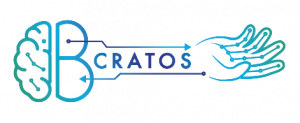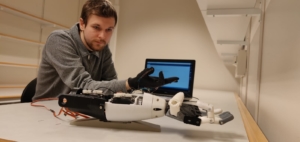A wireless signal is transmitted via FAT-IBC where a robotic hand mimics the movement of the user.
FAT- IBC Platform
Probingon AB is a clinical-grade wearable and IoMT diagnostics company commercializing the FAT-IBC platform technology that is being used for B-CRATOS.
The FAT-IBC platform was developed by Dr. Robin Augustine , B-CRATOS coordinator and the research group Microwaves in Medical Engineering (MMG) at Uppsala University. Professor Augustine and colleagues have established the feasibility of a body-centric communication platform that makes use of the human tissue properties at microwave frequencies to optimize body-centric radio communication links. This platform is coined Fat-IBC due to the adipose and fatty tissue, which is present almost anywhere in the body, has microwave properties that contrast with other tissues such as skin and muscle and facilitate microwave propagation inside the body.
As data becomes the holy grail for the healthcare industry, for clinical-grade IBC platforms and BCI devices it opens up a new range of possibilities. The human body’s brain and vital signs make it a perfect biological data-generating system. BCI-based neural bypass system that uses the FAT-IBC platform enables a pathway for a wireless neural data communication system between the BCI of the patient and the prosthetics it requires to restore mobility due to loss of neural function. The importance of being able to create a clinical-grade wearable FAT-IBC wireless system that connects the patient’s BCI cannot be underestimated as it will create a larger bandwidth to effectively transmit neural data less energy consumption create a user-friendly design of the system.
B-CRATOS will among others be launched towards patients with neurological brain disorders. But most importantly, the challenges being solved in B-CRATOS will open up a range of new markets in pain management, sleep apnea, electroceuticals, virtual reality and e-learning, robotics, gaming, and infotainment.
Other possibilities via FAT-IBC technology and active sensors will be in defining effective chronic disease management strategies for the profession. Since most conditions are exacerbated by lifestyle choices and poor management, clinical-grade wearables such as the FAT-IBC platform are uniquely geared to provide deeper insight into preventive care practice for remote and hospital care settings. As a consequence, providers will seek to transition to outcomes-dependent compensation structures. Hence, the ability to accurately monitor patients via mobile technology to predict and prevent adverse events is an essential component of modernizing outdated care models.
Clinical grade wearables technologies are poised to evolve from technologies that simply reported real-time data to those that track, diagnose, and ultimately provide the necessary data for systems support and clinical decision-making.
#healthcareinnovation, for #medicaldevice, creating #b_cratos, using #microwaves via #fat_ibc, to transmit #neuraldata between #bci and #prosthetics



